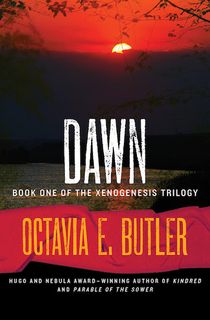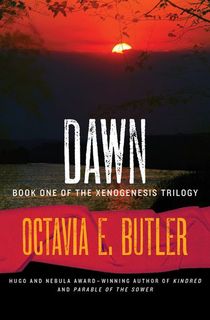Lilith Iyapo is alive. She knows that much.
Since the disaster on Earth, her existence is defined by a series of disorienting, brutal awakenings, each return to consciousness forcing her to confront old horrors anew: her family is dead. She is the prisoner of mysterious captors who saved her from Earth's nuclear holocaust, but now leave scars on her while she sleeps. She is forced to come to terms with what once was and what her present is.
RELATED: Octavia Butler Books: The Complete Canon
When Lilith awakens to find one of her captors in her chamber, she's determined to find out who they are and what they want from her. She must face the dark side of survival and decide how she fits into her current society.

Octavia Butler
Photo Credit: AlchetronThe late Octavia Butler wrote science fiction that envisioned radical changes to humanity. Her prescient near-future Parable series, the Patternist series, and the standalone vampire novel Fledgling all explore complex questions of identity and survival. And in Butler's Xenogenesis Trilogy, also known as Lilith's Brood, the transformation experienced by humanity is truly unprecedented.
This gripping series examines the hierarchal tendencies of mankind and questions how it hinders or helps the human race.The first novel in the series, Dawn, will soon be adapted into an Amazon series by A Wrinkle in Time director Ava Du Vernay. In light of the adaptation news, we’re sharing an excerpt from the stunning post-apocalyptic novel.
Read an excerpt from Dawn below, then download the book!
What would they do this time? Ask more questions? Give her another companion? She barely cared.
She sat on the bed, dressed, waiting, tired in a deep, emptied way that had nothing to do with physical weariness. Sooner or later, someone would speak to her.
She had a long wait. She had lain down and was almost asleep when a voice spoke her name.
“Lilith?” The usual, quiet, androgynous voice.
She drew a deep, weary breath. “What?” she asked. But as she spoke, she realized the voice had not come from above as it always had before. She sat up quickly and looked around. In one corner she found the shadowy figure of a man, thin and long-haired.
Was he the reason for the clothing, then? He seemed to be wearing a similar outfit. Something to take off when the two of them got to know each other better? Good god.
“I think,” she said softly, “that you might be the last straw.”

Author Octavia Butler, who traveled to Machu Picchu in the 80s as research for Lilith's Brood.
Photo Credit: Octavia E. Butler papers. The Huntington Library, Art Collections, and Botanical Gardens.“I’m not here to hurt you,” he said.
“No. Of course you’re not.”
“I’m here to take you outside.”
Now she stood up, staring hard at him, wishing for more light. Was he making a joke? Laughing at her?
“Outside to what?”
“Education. Work. The beginning of a new life.”
RELATED: Black Science Fiction and Fantasy Authors You Need to Read
She took a step closer to him, then stopped. He scared her somehow. She could not make herself approach him. “Something is wrong,” she said. “Who are you?”
He moved slightly. “And what am I?”
She jumped because that was what she had almost said.
“I’m not a man,” he said. “I’m not a human being.”
She moved back against the bed, but did not sit down. “Tell me what you are.”
“I’m here to tell you … and show you. Will you look at me now?”
Since she was looking at him—it—she frowned. “The light—”
“It will change when you’re ready.”
“You’re … what? From some other world?”
“From a number of other worlds. You’re one of the few English speakers who never considered that she might be in the hands of extraterrestrials.”
“I did consider it,” Lilith whispered. “Along with the possibility that I might be in prison, in an insane asylum, in the hands of the FBI, the CIA, or the KGB. The other possibilities seemed marginally less ridiculous.”
The creature said nothing. It stood utterly still in its corner, and she knew from her many Awakenings that it would not speak to her again until she did what it wished—until she said she was ready to look at it, then, in brighter light, took the obligatory look. These things, whatever they were, were incredibly good at waiting.
RELATED: 10 Octavia Butler Quotes to Live By
.jpg?w=32)
She made this one wait for several minutes, and not only was it silent, it never moved a muscle. Discipline or physiology?
She was not afraid. She had gotten over being frightened by “ugly” faces long before her capture. The unknown frightened her. The cage she was in frightened her. She preferred becoming accustomed to any number of ugly faces to remaining in her cage.
“All right,” she said. “Show me.”
The lights brightened as she had supposed they would, and what had seemed to be a tall, slender man was still humanoid, but it had no nose—no bulge, no nostrils—just flat, gray skin. It was gray all over—pale gray skin, darker gray hair on its head. The hair grew down around its eyes and ears and at its throat. There was so much hair across the eyes that she wondered how the creature could see. The long, profuse ear hair seemed to grow out of the ears as well as around them. Above, it joined the eye hair, and below and behind, it joined the head hair. The island of throat hair seemed to move slightly, and it occurred to her “that might be where the creature breathed—a kind of natural tracheostomy.
Lilith glanced at the humanoid body, wondering how humanlike it really was. “I don’t mean any offense,” she said, “but are you male or female?”
“It’s wrong to assume that I must be a sex you’re familiar with,” it said, “but as it happens, I’m male.”
Good. “It” could become “he” again. Less awkward.
“You should notice,” he said, “that what you probably see as hair isn’t hair at all. I have no hair. The reality seems to bother humans.”
“What?”
“Come closer and look.”
“She did not want to be any closer to him. She had not known what held her back before. Now she was certain it was his alienness, his difference, his literal unearthliness. She found herself still unable to take even one more step toward him.
“Oh god,” she whispered. And the hair—the whatever-it-was—moved. Some of it seemed to blow toward her as though in a wind—though there was no stirring of air in the room.

Butler seated in front of her bookcase in 1986.
Photo Credit: Patti Perret, 1986. The Huntington Library, Art Collections, and Botanical Gardens.She frowned, strained to see, to understand. Then, abruptly, she did understand. She backed away, scrambled around the bed and to the far wall. When she could go no farther, she stood against the wall, staring at him.
Medusa.
Some of the “hair” writhed independently, a nest of snakes startled, driven in all directions.
Revolted, she turned her face to the wall.
“They’re not separate animals,” he said. “They’re sensory organs. They’re no more dangerous than your nose or eyes. It’s natural for them to move in response to my wishes or emotions or to outside stimuli. We have them on our bodies as well. We need them in the same way you need your ears, nose, and eyes.”
“But …” She faced him again, disbelieving. Why should he need such things—tentacles—to supplement his senses?
“When you can,” he said, “come closer and look at me. I’ve had humans believe they saw human sensory organs on my head—and then get angry with me when they realized they were wrong.”
“I can’t” “she whispered, though now she wanted to. Could she have been so wrong, so deceived by her own eyes?
“You will,” he said. “My sensory organs aren’t dangerous to you. You’ll have to get used to them.”
“No!”
The tentacles were elastic. At her shout, some of them lengthened, stretching toward her. She imagined big, slowly writhing, dying night crawlers stretched along the sidewalk after a rain. She imagined small, tentacled sea slugs—nudibranchs—grown impossibly to human size and shape, and, obscenely, sounding more like a human being than some humans. Yet she needed to hear him speak. Silent, he was utterly alien.
“She swallowed. “Listen, don’t go quiet on me. Talk!”
[...]
"What’s your name?” she asked.
“Kaaltediinjdahya lel Kahguyaht aj Dinso.”
She stared at him, then sighed, and shook her head.
“Jdahya,” he said. “That part is me. The rest is my family and other things.”
She repeated the shorter name, trying to pronounce it exactly as he had, to get the unfamiliar ghost j sound just right. “Jdahya,” she said, “I want to know the price of your people’s help. What do you want of us?”
RELATED: Library of America to Honor Octavia E. Butler and Ursula K. Le Guin
“Not more than you can give—but more than you can understand here, now. More than words will be able to help you understand at first. There are things you must see and hear outside.”
"Tell me something now, whether I understand it or not.”
His tentacles rippled. “I can only say that your people have something we value. You may begin to know how much we value it when I tell you that by your way of measuring time, it has been several million years since we dared to interfere in another people’s act of self-destruction. Many of us disputed the wisdom of doing it this time. We thought … that there had been a consensus among you, that you had agreed “to die.”
“No species would do that!”
“Yes. Some have. And a few of those who have have taken whole ships of our people with them. We’ve learned. Mass suicide is one of the few things we usually let alone.”
“Do you understand now what happened to us?”
“I’m aware of what happened. It’s … alien to me. Frighteningly alien.”
“Yes. I sort of feel that way myself, even though they’re my people. It was … beyond insanity.”
“Some of the people we picked up had been hiding deep underground. They had created much of the destruction.”
“And they’re still alive?”
“Some of them are.”
“And you plan to send them back to Earth?”
“No.”
“What?”
“The ones still alive are very old now. We’ve used them slowly, learned biology, language, culture from them. We Awakened them a few at a time and let them live their lives here in different parts of the ship while you slept.”
“Slept … Jdahya, how long have I slept?”
Want to keep reading? Download Dawn today!
The trilogy begins with Dawn from the viewpoint of Lilith Iyapo, a survivor of Earth's nuclear holocaust. Her home planet is ruined. Humans are nearly extinct. A mysterious species can restore and repopulate Earth—but their aid comes with a price. She is introduced to an alien race, the Oankali, who have three genders: male, female, and Ooloi.
RELATED: Impactful Female and Science Fiction Fantasy Authors You Need to Read
Eventually Lilith bonds with Nikanj, an Ooloi, and the Oankali use this bond to obtain Lilith's help to train humans in the newly-restored Earth. The Oankali have made Earth habitable again and offer humans access to the planet as an exchange for interbreeding and blending the human and Oankali races. The Oankali believe their offering is the solution to humans' fatal combination of intelligence and hierarchal tendencies — but humans rebel.
This post is sponsored by Open Road Integrated Media. Thank you for supporting our partners, who make it possible for The Portalist to celebrate the sci-fi and fantasy stories you love.


